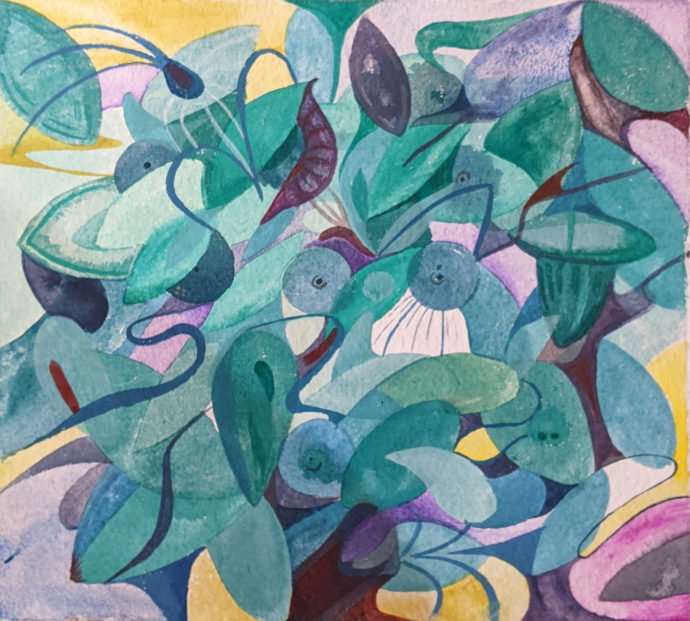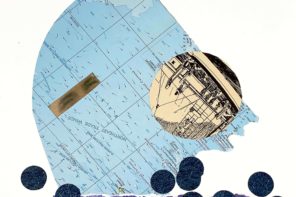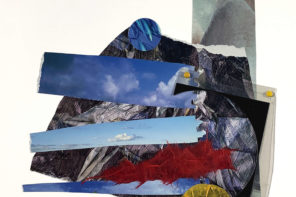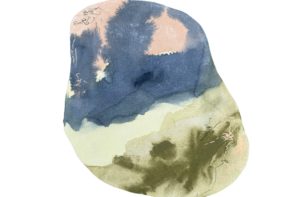Sixteen years ago, today, my father died. Even now, after such a long time, grief picks me up by the nape and I instinctively go limp, let myself be carried away. I sat with him the morning of his last day. He’d lost his ability to speak months before, but on that last morning he looked through me and whispered, Mama. I took it as a sign that she was standing behind me and had come for him. It was consoling. Later, I found out that the last word for most men is some form of mother. Facts are either beautiful or they leech the beauty from things.
Last night, M and I ran into Suzanne, the elderly lady who lives down the street with Gilbert, her plodding and adorable basset hound. In the middle of our conversation, she tells us her mother told her before she died that she would always look out for her. Years later, while dusting the last photo of her mother, Suzanne noticed a perfect heart in her favorite color, pink, had appeared to encircle her mother’s form. She saw it as a sign. I can feel M ready with a scientific explanation, so I detour our talk. As we walk away, M says, I could have told her why that probably happened to that photo. I counter, What good would it do to take that away from her?
We’ve been watching a cooking masterclass in the evenings. M’s into the nuances, the tips he doesn’t already know, whereas I’m fascinated by the idea of expanding the palate, of learning the synonyms and antonyms of flavors. The way Massimo, the chef, describes the flavors and where they occur in the mouth is the same way I think of language. Where words rest, how they feel spoken, how the mouthfeel of English is very different from German or French. As we continue watching, I marvel at my own lack of attention. Unlike M, who slows down to smell everything and works at every knot until he’s unraveled the tight weave of scents, I rarely pay attention to the tether between smell and taste. When he asks me to smell something, I often recognize it but can’t name it. A kind of synesthesia takes over and instead of “mango,” I use words like, “soft, warm.” This must be how children feel, the ones who lose their mother tongues over time. They are haunted by a vague understanding but never a sharp, clear definition. A ghost standing in the fog rather than behind you in the mirror.
I start to watch Ohio Impromptu because of Jeremy Irons’ rocks-tumbling-in-waves voice but stop. I can never get through Beckett in one go. There’s always something thrumming below the surface of his work, an invisible thread whose electricity I can sense and am drawn to like the electric fences I touched as a child. All day I would carry buzzing in my fingertips. All day I would wonder at my strange temptation towards pain. I begin again. Make it to the Isle of Swans. Stop. Think of my conversation with Sue, how intimidated I was to talk beauty with someone who has a PhD in it. But what I remember is us talking about swans, how we both love them because they symbolize beauty yet if you ever encounter one in real life, they’re angry, aggressive. That may be the best definition of beauty I’ll ever be able to give. I begin again. The knocks and pauses disturb me. I look up Ohio Impromptu and come across a line that says it belongs to “Beckett’s ghost period.” I hope I have a ghost period. M comes in from the studio and I tell him I’m watching Beckett. He loves Beckett. Every time he does a performance art piece, he recites you’ll never be the same after this, you were never the same after that before he begins. It’s the closest he comes to prayer. I don’t finish Beckett. Instead, I go to bed early and watch a show about ghost hunting. Ghost hunters believe three knocks in the dark are a sign evil is present. In one episode, a voice comes through the taped static to ask, Hello? Where am I? The team doesn’t discover it until later. No one goes back to answer.
I bought a cloud today. I plan to hang it in the corner of my studio. M and I watched a documentary last summer that said if temperatures continue to rise, clouds could become extinct. For weeks after, I kept imagining an uninterrupted sky, a blue expanse of unending prairie above. I was sad all the time. I tried to paint the cumulonimbus above me with the same impulse of trapping memories in paper with ink. But clouds are very difficult to capture. They are an exercise in the subtleties of texture and light. I failed at every attempt.
Friday night. M comes in from the studio and looks deeply exhausted. Says he’s tired of art. He grabs a book and settles on the couch. I grab Carmen Giménez Smith’s Bring Down the Little Birds and sink into the other side. I don’t reach out to touch this wound he’s carrying. Instead, I let it breathe. M is reading Nose Dive: A Field Guide to the World’s Smells, which I gave him for our anniversary. We read in silence for a time and then M reads me a section. When we smell another person’s body, we literally bring a portion of that body into our own body, into tissues in our head, which then signals its presence in our mind. . . When we smell something, it’s because particles of that thing—its vaporized, airborne, volatile molecules—enter us and momentarily become part of us. This line resonates since I am constantly pressing myself against his back, nose to spine, inhaling deeply. I’ve learned how important smell is for memory. Combine creosote, horse sweat, and wood smoke, and all the faint sketch lines of my childhood memories darken, fill in with color. I smile and say, Think of how much beer must be a part of you, then. He finally laughs. We continue to read until I feel him looking at me and turn my head. You’re what makes me happiest, he says. I smile and say, Same. The cloud surrounding him has lifted. He heads to bed before me. I finish Giménez Smith and the dam I’ve been holding back breaks on the last pages. I think about my dad, his brain tumor, how they cracked him open, but what came out didn’t all come out. The shell healed. The space refilled. My father, too, would have liked to have been other things: a scholar, a writer. Instead, his mind betrayed him, grew a great tentacled thing that stole his words, his movement, his sight, and finally, his life. I cry so much at the end of the book that I have to soak my eyes before I go to bed. The house creaks against the frigid cold outside. When I get upstairs, M is on my side of the bed, warming it to make sure I don’t have to get into cold sheets. When we turn off the lights, I curve the comma of my body into his. He is asleep almost instantly. I listen to the tides of his breath, happy to have found the safety of this shore.
Today my mother told me how when she first came to Canada, she was very concerned about the number of gift shops she noticed everywhere. She kept wondering what could possibly be in this country that could require so much poison. In German, gift isn’t a present but a means to kill.
I can’t help but imagine her in our old station wagon, miles of open highway, so different from the Autobahn she was used to, staring out the window, wondering if this country she was moving to held monsters she didn’t know about. She didn’t know yet that she would have me. That she would tell me stories filled with monsters. That instead of a daughter who longed to be a princess, she would get a daughter who felt sorry for the wolf whose stomach was filled with stones before his body was thrown down a well. Who watched Jaws at age four and loved sharks ever after, whose imagination, left alone in the dark, would transform every mouse in the wall of that old farmhouse into creatures scratching to get out. She told me that when she was pregnant with me, a mouse ran out and startled her, and she hit her arm. Someone told her I would be born with a birthmark. And I was. On the back of my left arm, a tiny light brown triangle. The memory of a bruise made permanent on someone else.
What’s behind my own impulse to try to keep something in a painting, photo, or on the page? Which memories get pumiced away by time versus which ones stay? The memory that came back to me suddenly of sledding with my father. Of my mother holding a needle over someone’s wrist to tell how many children they would have. Straight lines, boys. Circles, girls. Any time she tried it over my wrist: wild, oblong ovals. I will never have a child; I think I knew it even then. The thought of bones crocheting together inside my womb always terrified me, so what I leave behind will be more subtle—laugh lines around M’s eyes, a poem, an inheritance of a cloud that hung on a studio wall for decades—all things that will evaporate given enough time.
Right now, my mother is sitting in a chair close to where my father passed away. She was with him at the end, told him as the sun was setting that if he had to leave her, to take the last sunbeam. He exhaled one final time as the sun slid over the horizon. I wish there were a word I could say to her to make today better, but I’ve learned that certain memories salt the body, must be cried and sweat out.
“Vanessa wrote on the white wall with a red marker.” This diary entry was written about Vanessa Moeller when she was just one; it was a portent of things to come. Since then, her poems and short stories have appeared in numerous periodicals, including The Fiddlehead, PRISM international, The Antigonish Review, CV2, and The Pottersfield Portfolio, and have won several awards, including the Atlantic Poetry Prize and an honorable mention in the poetry category of the National Magazine Awards. Her first poetry collection, Our Extraordinary Monsters, was published by Signature Editions in 2009. Vanessa lives on the east coast of Canada.




